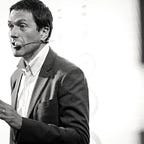Overcoming Humanity’s Collective Amnesia Is the Key to Conquering Coronavirus
Every day, we are watching in real time as COVID-19 incites a smart working revolution. A change that CEOs have tried to implement for years has become a reality for millions of people in a matter of weeks.
But in thirty years, will we remember what it took to get here?
The human price paid during wars and pandemics is awful, but the future economic and social effects are not necessarily so. After all, we do not yet live in a binary system where choices are limited to wholly good or wholly tragic outcomes.
WWI gave us the first airplanes, not to mention new methods of photography, sound recording, and communication. Afterward, Germany’s financial hardship from having to pay billions in reparations led to its transition to a welfare state.
The status of women, too, improved dramatically after WWI. They became a major part of the labor force, started wearing trousers, and gained the right to vote. And yet, a century later, there’s still discrimination between the sexes. This, despite growing proof that women are genetically stronger than men, as shown by a higher survival rate during coronavirus.
The problem is, as we adjust to the new reality coming out of a catastrophe, we adapt quickly. We forget.
What have we already forgotten in our pursuit of happiness?
Human memory can only process a limited amount of information and, as Yuval Harari wrote in the Financial Times, this makes it easy for us to forget the weight of extraordinary measures if they’re left in place long enough. We can even forget they’re there entirely. Israel, for example, has yet to remove many of the “temporary” measures put in place in 1948 during the War of Independence.
In 2050, will we still be washing our hands for 20 seconds? Or wearing masks when we have cold or flu symptoms? And will we remember why?
How long will it take us to forget that this pandemic has lowered pollution levels — an area where each world summit has failed?
Will we ignore the human misery in our history, as was done with the photos included with the Voyager probe in 1977, depicting only human successes and skirting mention of Hiroshima and Auschwitz?
Nobel-awarded Daniel Kahneman mentions that happiness is how you feel about your life while you are living it, while satisfaction is how you feel about your life while you are thinking about it.
And data suggests that satisfaction is more important than happiness.
Unfortunately, during this quarantine, we’re observing a search for happiness. We see it in the 652% sales increase of bread machines, as well as in the 44% and 34% respective decrease of telescope and musical instrument sales. Most people would admit that changes in consumer behavior have made humans more selfish. However, they probably wouldn’t be able to tell you how those changes happened.
In fact, it can be traced back to the Hollywood narrative, the cultural arm of the Marshall plan in the 50s, which promoted an aspirational, individualistic consumer society and lifestyle. As A.W. Purdue writes, “The implosion of the Soviet Bloc in the late 1980s and early 1990s is often seen as a ‘shopping revolution’ in that, as windows were opened by the media, the attractions of Western Europe’s consumer society became evident.”
This history, despite its detrimental effects, has slipped into our collective amnesia.
And we’re letting the same thing happen again now.
Is it personal, or is it politics?
In his novel The Betrothed, Alessandro Manzoni stresses the relationship between truth and lies, false opinions and beliefs. Politicians provide an easy example of this dichotomy. At the beginning of March, just weeks ago, US President Trump and Brazil President Bolsonaro publicly denounced the virus as “just a flu.” President Lopez Obrador of Mexico has insisted that people continue to hug each other, that “nothing is going to happen.”
Heads of state across the world are showing lack of leadership in favor of cheap, nationalist self-promotion. The ego trap is delaying — or at least complicating — a global solution. This was demonstrated when US president Trump promised “large sums” for exclusive rights to a vaccine.
Will people remember these betrayals during the next elections? Or are we clinging to ignorance?
We all understand that markets, supply chains, and people are interconnected. The financial stimulus measures of one country will cascade-benefit another. Likewise, refusing to wear a mask or get a vaccine is a choice that impacts others — a truth that is proving slow to catch on. Despite thousands of Americans dying daily of COVID-19, fourteen US states exempted religious gatherings from stay-at-home orders.
The philosopher Hume said, “Reason is, and ought only to be, the slave of the passions.” This pandemic may come to be remembered as a great ego exercise.
Do we learn from history, or do we repeat it?
Historical change is not easily measurable. In fact, disentangling the contribution of wars from other factors is difficult. But memory is our most powerful tool to avoid repeating our mistakes.
A Japanese engineer named Yanosuke Hirai demonstrated this in the 1960s when he used a devastating tsunami of 869 to argue for moving a nuclear power plant to higher ground. Thanks to advice based on an event centuries earlier, the plant did not suffer damages decades later during the 2011 Fukushima disaster — despite being only seventy-five miles away.
Predictive models from computer simulations and current data are not enough to save us. Great change can, and almost certainly will, come out of this pandemic. But now is the time to pull together by securing our memories, not to pull ahead by accelerating forgetfulness.
Originally published in GLOBIS Insight https://globisinsights.com/career-skills/collective-amnesia/
